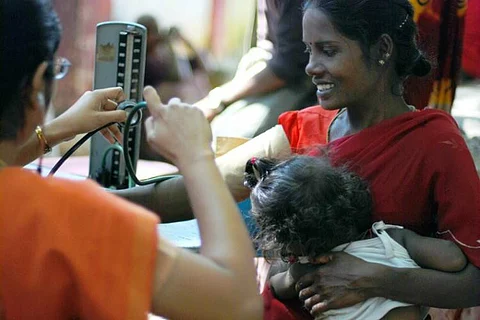

The state government, after much delay, launched the Arogya Karnataka programme - a health scheme to provide treatment at affordable cost.
The scheme was officially launched on Friday by Chief Minister Siddaramaiah.
With this, Karnataka will be the first state to implement a scheme towards offering universal health coverage (UHC), according to the CM.
However, in the first phase, it will be implemented in only 10 hospitals to begin with.
The 10 major hospitals across the state that have been chosen are: KC General Hospital, Jaya Sri Jayadeva Institute of cardiology and research, PMSSY, Victoria Campus, Mandya Institute of Medical sciences, Mcgann Institute of Medical Sciences, Shimogga, Wenlock District Hospital, Mangaluru, Karnataka institute of Medical sciences, Hubli, Gulbarga Institute of Medical Sciences, Gulbarga and Vijayanagara Institute of Medical sciences, Bellari.
The scheme would however be rolled out in a phased manner in the months to follow and be extended to hospitals across the state according to minister for health and family welfare, KR Ramesh Kumar.
In the next phase, it will be rolled out in 33 major and district level hospitals. This would be done by the end of June according to him.
Patients can avail treatment by producing the UHC cards.
Ajay Seth, additional chief secretary, department of health and family welfare said that either Aadhaar or ration cards could be produced to avail the benefits of the scheme at the government hospitals where it is applicable. A unique ID called the ArkID would be generated on the first visit of the patient.
It is estimated that 1.43 crore households in the state will benefit from the service. While benefits of the scheme can be availed in government hospitals through the alternate methods provided for enrolment, producing Aadhaar card or number is mandatory for referral to private hospitals.
A mandatory consent will be obtained using a pre-printed self-declaration form from the enrolling beneficiary to use his details only for the purpose of enrolment, according to a note issued by the department.
Where to avail?
While primary healthcare can be availed only in primary health institutes (PHI) run by the state, secondary care treatment would be made available at private hospitals only if the said treatment is not available at government hospitals.
Tertiary healthcare services can also be availed at designated hospitals. In case, PHIs within the same or neighbouring district do not have the medical capability for the required tertiary healthcare treatment, only then the patient shall be referred for treatment in any of the empanelled private hospitals.
Patients who require complex secondary and tertiary care ought to visit public hospitals, following which they would be referred to private hospitals if the treatment is not available at government set-ups.
What is the cap?
While all patients falling in the below poverty line (BPL) category can avail treatment free of cost, those in the above poverty line (APL) category would have to foot 70% of the treatment charges for tertiary care while the state will pay the rest.
Financial assistance of up to Rs 30,000 per annum will be provided for specified complex secondary healthcare treatment to a family of up to five persons.
In the event of the family requiring specific tertiary healthcare treatment, this annual limit will be increased to Rs 1.5 lakh per annum. For any family needing specified emergency tertiary healthcare treatment even after full utilisation of the annual limit, additional assistance of Rs 50,000 will be provided.